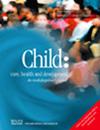Affiliate Stigma and Its Predictors in Parents of Children With Autism in the Early Post-diagnosis Phase
Abstract
Background
Affiliated stigma refers to internalized stigma among family members of stigmatized individuals. Affiliate stigma experienced by parents of children with autism plays a vital role in both the child's rehabilitation and the parents' well-being, whereas the affiliate stigma and its possible predictors need to be further examined.
Aims
The study aims to describe the characteristics of affiliate stigma experienced by parents of children with autism in the early post-diagnosis period and to explore its predictors.
Methods
The study was conducted from September 2020 to March 2022 in Guangzhou, China. Participants included 116 parents of children newly diagnosed with autism who completed baseline self-report measures of affiliate stigma (Affiliate Stigma Scale [ASS]), coping style (Simplified Coping Style Questionnaire [SCSQ]) and social support (Social Support Rating Scale [SSRS]) at the initial diagnosis (T1) and 1-year follow-up (T2). Autism features were assessed by parents using the Autism Behavior Checklist at T1. Generalized estimating equations were used to identify the key predictors of affiliate stigma.
Results
Scores for parental affiliate stigma were 43.4 ± 13.7 at the initial diagnosis and 44.7 ± 15.9 one year later. Parents of children with siblings or co-occurring conditions experienced higher levels of affiliate stigma, and negative coping styles and lower levels of subjective support predicted higher affiliate stigma during the first year after autism diagnosis.
Conclusions
Parents experienced moderate and stable affiliate stigma during the first year after their children's autism diagnosis, especially those with children who have siblings or co-occurring conditions and thus need additional support. Interventions should be focused on reducing negative coping and providing more subjective social support.

 求助内容:
求助内容: 应助结果提醒方式:
应助结果提醒方式:


